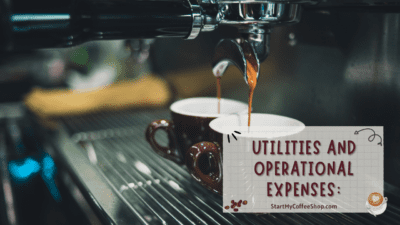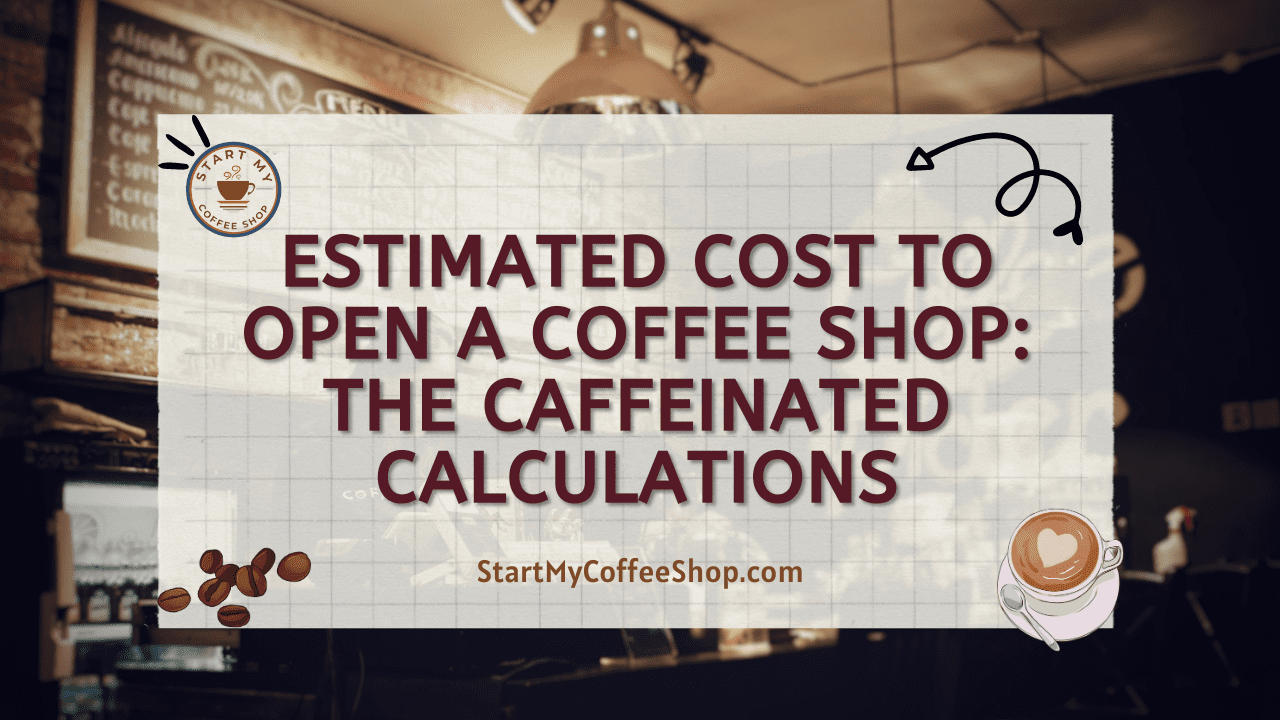Opening a coffee shop is a dream for many entrepreneurs and coffee enthusiasts alike. The aroma of freshly brewed coffee, the warm ambiance, and the bustling atmosphere make it an inviting business venture. However, before embarking on this caffeinated journey, it is crucial to understand the estimated costs involved.
The estimated cost to open a coffee shop can vary depending on factors such as location, size, equipment, permits, and staffing. On average, it can range from $80,000 to $300,000 or more. Thorough research and budgeting are crucial for the progress of this caffeine-fueled business venture.
In this article, I will explore the various factors that contribute to the overall expenses of opening a coffee shop, offering insights and guidance to aspiring coffee entrepreneurs.
1. Location:
Location plays a crucial role in determining the cost of opening a coffee shop. The choice of location can significantly impact the rent or purchase price of the premises. Prices can vary greatly depending on the area, city, and even the specific neighborhood.
High-traffic locations in popular urban areas often come with a hefty price tag due to the increased demand and potential customer base. These prime locations offer the advantage of a constant flow of foot traffic, visibility, and exposure to a larger customer pool. However, the higher costs associated with such areas may pose financial challenges, especially for new or small-scale coffee shop owners.
On the other hand, more affordable options can be found in suburban or up-and-coming areas. These locations may offer lower rental or property prices, allowing entrepreneurs to allocate their financial resources more efficiently.

While the foot traffic may not be as high as in bustling urban areas, these neighborhoods can still attract a loyal customer base through targeted marketing efforts, community engagement, and a unique value proposition.
When considering the location, it is essential to assess the space requirements for the coffee shop. This includes determining the anticipated number of customers, the size of the kitchen and seating area, and the necessary equipment.
A spacious coffee shop with ample seating and a larger kitchen area may require a larger space, which can impact the rental or purchase cost. However, a smaller, more intimate space may be sufficient for a specialty coffee shop with a focus on takeaway orders or a cozy ambiance.
Ultimately, finding the right balance between location, size, and cost is crucial for the financial stability of a coffee shop. Conducting thorough market research, considering the target demographic, and evaluating the competition in the area can help inform the decision-making process.
It is advisable to consult with a real estate agent or business advisor who specializes in the food and beverage industry to ensure that the chosen location aligns with the coffee shop’s goals and budget.
Read more about Cost to Start Coffee Shop Business: The Unfiltered Finances
2. Permits, Licenses, and Legalities:
Operating a coffee shop involves navigating a complex web of permits, licenses, and legal requirements. These prerequisites are essential to ensure that the business operates within the boundaries of the law and maintains high standards of health, safety, and hygiene. Failure to comply with these regulations can result in penalties, fines, or even closure of the establishment.
The specific permits and licenses needed to operate a coffee shop can vary depending on the location and local regulations. Common requirements include health permits, which ensure that the establishment meets the necessary standards for food handling, storage, and preparation. These permits often involve inspections by health authorities to assess the cleanliness and safety of the premises.
Food service licenses are another critical aspect. They are typically required to serve food and beverages to the public. These licenses often require compliance with specific guidelines, such as proper food handling procedures, allergen awareness, and sanitation practices.
Zoning permits are necessary to ensure that the coffee shop is established in a designated area appropriate for commercial use. Local zoning regulations dictate the specific types of businesses that are allowed in particular zones, such as commercial or mixed-use areas.
Additionally, business registrations and licenses may be required at the municipal or state level. These registrations establish the coffee shop as a legal entity and ensure that it adheres to taxation and reporting obligations.
To navigate through the complexities of obtaining the necessary permits and licenses, it is advisable to conduct thorough research and seek professional assistance. Engaging the services of a lawyer or consultant specializing in the food and beverage industry can provide valuable guidance and ensure compliance with all legal obligations.
These professionals can assist in understanding the specific requirements, completing the necessary paperwork, and representing the business during inspections or regulatory processes.
3. Equipment and Furnishings:
Equipping a coffee shop with the necessary tools and equipment is a substantial investment that directly impacts the quality of products and the overall customer experience. Key items include espresso machines, coffee grinders, brewing equipment, refrigeration units, and POS systems. The cost of these items can vary significantly based on factors such as quality, brand reputation, and capacity.
Espresso machines are the heart of any coffee shop, and their prices can range from a few hundred to several thousand dollars, depending on the complexity and features they offer. Coffee grinders, equally crucial for achieving the perfect grind consistency, come in various price ranges depending on their quality and precision.
Brewing equipment, such as pour-over stations or drip coffee machines, should also be considered. Prices for these items depend on their capacity, functionality, and brand reputation. Additionally, investing in quality refrigeration units is necessary to store perishable items like milk and food products, ensuring freshness and safety.
Point of Sale (POS) systems are essential for efficient order management, inventory tracking, and sales analysis. These systems encompass hardware like touch-screen monitors, cash registers, barcode scanners, and software tailored to the coffee shop industry. Prices can vary depending on the system’s capabilities and the number of terminals required.
Furniture and décor are also significant factors in creating a welcoming and comfortable atmosphere for customers. Costs for tables, chairs, counters, and decorative elements will depend on the desired aesthetic, material quality, and customization options. It’s important to strike a balance between functionality, durability, and visual appeal to create an inviting space for customers to enjoy their coffee.
When budgeting for equipment and furnishings, it’s essential to research reputable suppliers, read reviews, and consider long-term durability and maintenance costs. Additionally, reaching out to coffee industry professionals or consulting with experienced coffee shop owners can provide valuable insights on the most suitable equipment options for your specific business goals and budget.
Investing in high-quality equipment and creating an inviting ambiance enhances the overall coffee shop experience, fosters customer loyalty, and contributes to long-term growth.
4. Staffing and Training:
The achievement of a coffee shop relies heavily on the expertise and warmth of its baristas. Hiring and training competent staff is a critical step in creating a memorable customer experience. When considering staffing needs, it’s essential to evaluate the number of employees required to efficiently operate the coffee shop during different shifts and peak hours.
Along with determining the staff size, it’s crucial to consider the associated costs, including salaries, benefits, and any additional expenses. Employee salaries can vary depending on factors such as experience, location, and job responsibilities. It’s important to research industry standards and local labor laws to ensure fair compensation while staying within your budget.

Benefits such as healthcare coverage paid time off, and retirement plans are valuable incentives for attracting and retaining skilled baristas. While these benefits come with additional costs, they contribute to employee satisfaction, loyalty, and overall productivity.
Investing in training programs for your staff is equally important. Baristas should receive initial training to familiarize themselves with the coffee brewing process, customer service protocols, and equipment operation. Ongoing training and development opportunities help enhance their skills, keep them up to date with industry trends, and ensure consistent quality in coffee preparation.
Consider partnering with local coffee associations, attending workshops, or organizing in-house training sessions to provide your team with the necessary tools and knowledge. Training can cover areas such as latte art, coffee cupping, brewing techniques, and customer engagement, ultimately elevating the overall coffee shop experience.
Moreover, fostering a positive work environment and encouraging open communication can boost team morale and job satisfaction. Regular performance evaluations, constructive feedback, and recognition programs can motivate employees and create a sense of belonging within the coffee shop community.
Remember, the baristas are the face of your coffee shop, interacting directly with customers and leaving a lasting impression. By carefully selecting, training, and nurturing your staff, you can create a team that is passionate, knowledgeable, and dedicated to delivering exceptional service, ensuring a loyal customer base and long-term progress.
Read more about Cost to Start Drive-Thru Coffee Shop: A Cupful of Expenses
5. Inventory and Supplies:
Managing the inventory of essential supplies is a crucial aspect of running a coffee shop. Coffee beans, milk, syrups, cups, lids, napkins, and other items form a significant part of the ongoing expenses. Estimating your monthly inventory requirements is vital to ensure you have sufficient stock to meet customer demand without incurring excessive waste.
To estimate your inventory needs, consider factors such as projected sales volume, customer preferences, and seasonal variations. Analyze historical data, if available, to identify patterns and trends that can help guide your inventory planning. It’s essential to strike a balance between having enough inventory to serve customers and avoiding excessive stock that may lead to waste and increased costs.
Establishing relationships with reputable suppliers is key to securing a reliable and cost-effective supply chain. Research and compare suppliers to ensure they can consistently provide high-quality products at competitive prices. Negotiating favorable pricing and delivery terms can help you optimize your cost management.
Regularly reviewing your inventory management practices is essential to minimize waste and control costs. Implementing inventory tracking systems, such as digital inventory management software, can streamline the process and provide real-time visibility into stock levels. This helps in identifying slow-moving items, avoiding stockouts, and preventing overstocking.
Monitoring inventory turnover rates allows you to identify fast-selling items and adjust your purchasing decisions accordingly. By focusing on items with high demand, you can optimize inventory levels and reduce the risk of waste or expiration.
Efficient storage and organization of inventory can also contribute to cost control. Properly labeled storage areas, first-in-first-out (FIFO) inventory rotation, and routine checks for product quality and freshness are essential practices.
Regularly reassessing your inventory needs, taking into account feedback from customers and staff, can help fine-tune your purchasing decisions. Be proactive in exploring new product offerings and staying informed about industry trends to cater to evolving customer preferences and maximize sales opportunities.
By diligently managing your inventory, maintaining strong supplier relationships, and optimizing your inventory practices, you can minimize waste, control costs, and ensure a steady supply of high-quality products for your coffee shop.
6. Marketing and Promotion:
Effective marketing and promotion play a vital role in attracting customers and building a loyal customer base for your coffee shop. It is crucial to allocate a budget for marketing activities, both online and offline, to create awareness and drive foot traffic to your establishment.
With a well-planned marketing strategy, you can increase brand visibility, engage with your target audience, and differentiate yourself from competitors.
Online marketing has become increasingly important in today’s digital age. Establishing a strong online presence through a website and social media platforms is essential. Utilize social media advertising to reach a broader audience and engage with potential customers. Create enticing content, such as visually appealing images of your coffee creations, behind-the-scenes glimpses, and interactive polls or contests to encourage interaction and build a community around your brand.
In addition to online efforts, offline marketing strategies are equally important, particularly for engaging with the local community. Consider forming partnerships with neighboring businesses, such as bakeries or bookstores, to cross-promote each other’s offerings.
Collaborate with local influencers or community organizations to host events, tastings, or workshops that showcase your coffee expertise. Participating in local festivals, farmers’ markets or charity events can also increase visibility and provide opportunities to connect with potential customers.
Word-of-mouth marketing remains powerful in the coffee industry. Encourage satisfied customers to share their experiences and recommend your coffee shop to their friends and family. Offer loyalty programs, referral incentives, or special discounts to reward and motivate loyal customers, thereby fostering a sense of loyalty and driving repeat business.
Monitoring the effectiveness of your marketing efforts is crucial to assess their effectiveness and make informed decisions. Analyze key metrics such as website traffic, social media engagement, customer feedback, and sales data to evaluate the impact of your marketing campaigns. Adjust your strategies accordingly based on the insights gained from these analytics.
Lastly, don’t underestimate the value of exceptional customer service. Encourage your staff to provide a friendly and personalized experience to every customer. Positive interactions and memorable experiences can lead to positive online reviews and valuable word-of-mouth recommendations.
Remember, effective marketing is an ongoing effort. Continuously adapt your strategies to stay relevant, respond to customer feedback, and capitalize on emerging trends. By combining both online and offline marketing initiatives, nurturing community relationships, and prioritizing exceptional customer experiences, you can establish a strong brand presence, attract a loyal customer base, and set your coffee shop up for long-term growth.
7. Utilities and Operational Expenses:

Operating a coffee shop entails various ongoing expenses that are crucial to consider for financial sustainability. These expenses include utilities such as electricity, water, and gas, which are necessary for powering equipment, lighting, heating, and cooling the premises. The specific costs for utilities can vary depending on factors like the size of your coffee shop, the number of appliances and machines in use, and the local rates set by utility providers.
In today’s digital age, internet connectivity is also essential for running a coffee shop smoothly. Whether it’s providing free Wi-Fi to customers or managing online orders and transactions, a reliable internet connection is necessary. Researching and selecting an internet service provider that offers a suitable plan with reliable speeds and affordable pricing is important to manage this expense effectively.
Cleaning services are another aspect to consider. Maintaining a clean and hygienic environment is crucial for customer satisfaction and compliance with health regulations. Depending on your preferences and capacity, you may choose to hire professional cleaning services or designate staff for cleaning duties. Budgeting for cleaning supplies and services is necessary to ensure the ongoing cleanliness of your coffee shop.
Insurance is a critical expense that provides protection and peace of mind in the event of unexpected incidents or accidents. General liability insurance, property insurance, and workers’ compensation insurance are some common types that coffee shop owners typically consider.
The cost of insurance can vary depending on factors such as the size of your establishment, the level of coverage required, and the location of your coffee shop. It is important to work with insurance providers who specialize in the food and beverage industry to ensure that you have appropriate coverage for potential risks.
Regular maintenance and repairs are unavoidable expenses for any business, including coffee shops. Equipment breakdowns, wear and tear, and routine upkeep are all factors to consider. Budgeting for maintenance costs and establishing relationships with reliable technicians or service providers can help minimize disruptions and ensure the longevity of your equipment.
Proper budgeting and regular monitoring of operational expenses are essential for maintaining financial sustainability. Keep track of your monthly expenses, review them regularly, and make adjustments as needed. Consider implementing cost-saving measures such as energy-efficient lighting, water-saving fixtures, or equipment maintenance schedules to optimize your expenses.
Additionally, staying informed about local regulations and incentives can help you identify opportunities to reduce costs or access grants and programs aimed at supporting sustainable practices or small businesses.
By proactively managing operational expenses, you can ensure the financial stability of your coffee shop and allocate resources effectively to deliver a quality experience to your customers while maintaining a stable business.
Read more about How Much Does It Cost To Open A Coffee Bar: Delving into the Expenses of Opening a Coffee Bar
Summary
Opening a coffee shop can be an exciting and thrilling venture, but it requires careful planning and a realistic understanding of the costs involved. From the location to equipment, permits to staffing, inventory to marketing, each aspect contributes to the estimated cost of opening a coffee shop.
By thoroughly researching and considering these factors, aspiring coffee entrepreneurs can make informed decisions, navigate financial challenges, and set themselves up for progress in the vibrant world of specialty coffee. So, grab your favorite cup of joe and let your entrepreneurial spirit percolate as you embark on this caffeinated adventure!
Frequently Asked Questions

Q: Are there any specific permits or licenses required to open a coffee shop?
A: Yes, coffee shops typically require health permits, food service licenses, zoning permits, and business registrations.
Q: How much does coffee shop equipment cost?
A: Espresso machines, grinders, brewing equipment, refrigeration units, and POS systems can range from a few thousand dollars to tens of thousands of dollars.
Q: What are the ongoing expenses involved in running a coffee shop?
A: Ongoing expenses include inventory and supplies (coffee beans, milk, cups, etc.), utilities (electricity, water, gas), operational costs (cleaning, insurance, maintenance), staffing, marketing, and rent or mortgage payments.
To learn more on how to start your own coffee shop checkout my startup documents here
Please note: This blog post is for educational purposes only and does not constitute legal advice. Please consult a legal expert to address your specific needs.

Hi! I’m Shawn Chun
My adventure in coffee began when I first launched my first coffee shop back in the early 2000s. I had to figure out so many things on my own and to make it worse within 2 years of opening two large corporate coffee chains moved in just blocks away from me!
As I saw smaller and even some larger coffee shops in the neighborhood slowly lose customers to these giant coffee chains and slowly close up shop, I knew that I had to start getting creative…or go out of business.
I (like you may be) knew the coffee industry well. I could make the best latte art around and the foam on my caps was the fluffiest you have ever seen. I even had the best state-of-the-art 2 group digital Nuova Simonelli machine money could buy. But I knew that these things alone would not be enough to lure customers away from the name brand established coffee shops.
Eventually, through lots of trial and error as well as perseverance and creativity I did find a way to not only survive but also thrive in the coffee/espresso industry even while those corporate coffee chains stayed put. During those years I learned to adapt and always faced new challenges. It was not always easy, however, in the end, I was the sole survivor independent coffee shop within a 10-mile radius of my location. Just two corporate coffee chains and I were left after that year. All told the corporate coffee chains took down over 15 small independent coffee shops and kiosks and I was the last one standing and thriving.
Along the years I meet others with the same passion for coffee and I quickly learned that it is not only “how good a barista is” that makes a coffee shop successful, but the business side of coffee as well.
Hence why I started this website you are on now. To provide the tools and resources for up and coming coffee shop owners to gain that vital insight and knowledge on how to start a coffee shop successfully.
Stick around, browse through my helpful blog and resources and enjoy your stay! With lots of LATTE LOVE!
Shawn







